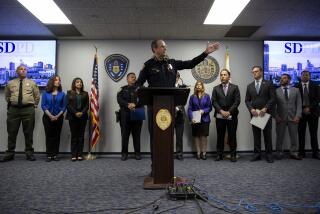Suspects in FBI Sting Case Confronted at Home in Series of Visits : Prosecutors Press Commodities Traders to Cooperate
- Share via
CHICAGO — A key prosecutor in the government’s investigation of alleged fraud in Chicago’s multibillion-dollar commodities futures industry went door to door Saturday, trying to pressure suspects to cooperate with federal agents.
Justice Department veteran Ira H. Raphaelson, who is heading the probe, and FBI agents pressed traders to agree to provide evidence against others who worked in the trading pits of the Chicago Board of Trade and the Chicago Mercantile Exchange.
Sources in the legal community said the tactic indicated that the government was still trying to obtain critical cooperation. The investigation is the most sweeping ever into the arcane industry that is as much a cornerstone of Chicago’s economy as entertainment is to the Los Angeles economy.
But its success, legal observers said, may depend more on what happens in the next several weeks than on what went on during the three years of undercover work.
Insight Into Case
The need for cooperation--and the government’s leverage for obtaining it--has been underscored by lawyers and commodities exchange officials monitoring the investigation and who, in a series of interviews, provided insight into how the Justice Department is developing the case.
For example, traders and brokers who were observed--and in some instances electronically recorded--by five undercover FBI agents posing as traders at the two markets have been accused of relatively minor infractions, but infractions that carry relatively major penalties.
They were confronted, for the most part, in late night and early morning by FBI agents and assistant U.S. attorneys in a series of subpoena-serving visits that began last Monday. The beginning of the public part of the investigation last week coincided with a major conference for commodity law attorneys on the Caribbean island of St. Martin.
Notes Timing
“If you are ever going to break open a major undercover investigation and go door to door, the time to do it is when most of the good lawyers in the area are out of town,” said a former Justice Department attorney who is representing suspects in the commodities investigation.
Some suspects were threatened during the visits with confiscation of expensive cars, art work and luxury condominiums under provisions of the federal racketeering law, defense lawyers said.
U.S. Atty. Anton R. Valukas, who spearheaded the investigation of the Mercantile Exchange and the Board of Trade, was the first federal prosecutor to use the powerful racketeering law in commodities cases. The law, which was designed to prosecute organized crime figures, enables the government to seize any profits derived from a pattern of criminal acts. Repeated violations of commodities laws could be construed by the courts as such a pattern.
For example, one suspect has been accused of alleged fraud totaling $4,000 on four trades with undercover FBI agent Richard Carlson at the Chicago Board of Trade’s Treasury bond futures pit. Authorities threatened him with three years in jail and confiscation of some of his property.
Awakened at Home
Another attorney said one of his clients was awakened at 6 a.m. Saturday at his house by an assistant U.S. attorney and Carlson. The lawyer said his client was accused of participating in an allegedly illegal trade with Carlson that totalled less than $5,000. Yet, the lawyer said, the authorities threatened to send the trader to jail and confiscate his property.
“These are very, very small fish at this stage,” the lawyer said. “They would never be prosecuted if this wasn’t part of a big project.”
“They are out looking for any wedge they can get. My guy happened to have a friend who was a bigger trader and they are really pressing him to cooperate against that person and some of the bigger traders he’s done a bit of business with,” said one lawyer who is defending a suspect in the probe.
“I personally don’t believe there are going to be as many people cooperating as the government thinks,” said Harvey M. Silets, another Chicago criminal lawyer who represents some traders under suspicion. “We anticipate there being a rather extended investigation and that many, many people are going to be questioned.”
Two Agree to Cooperate
Another defense attorney said Saturday that he has been hired by two traders who had agreed to cooperate after being threatened with harsh penalties by federal agents. He declined to say whether the traders had worn hidden tape-recorders in an effort to obtain incriminating evidence from colleagues.
A law enforcement official also said Saturday that some of the people implicated in the investigation had been persuaded to aid the government. But he declined to confirm published reports that some of the cooperating traders had been sent out with tape recorders to try to incriminate associates.
“They’ve flipped some, but I don’t know whether any of them have been wired,” said the official, who is not directly involved in the inquiry.
Some defense lawyers said that many of the people being subpoenaed in this phase of the inquiry have been accused of relatively minor violations involving relatively small amounts of money.
‘Exciting Developments’
The lawyer said, however, that some of the traders under subpoena have indicated that they possess information that could lead prosecutors to what the attorney characterized as “pretty exciting developments.” He declined to be specific.
More to Read
Sign up for Essential California
The most important California stories and recommendations in your inbox every morning.
You may occasionally receive promotional content from the Los Angeles Times.













